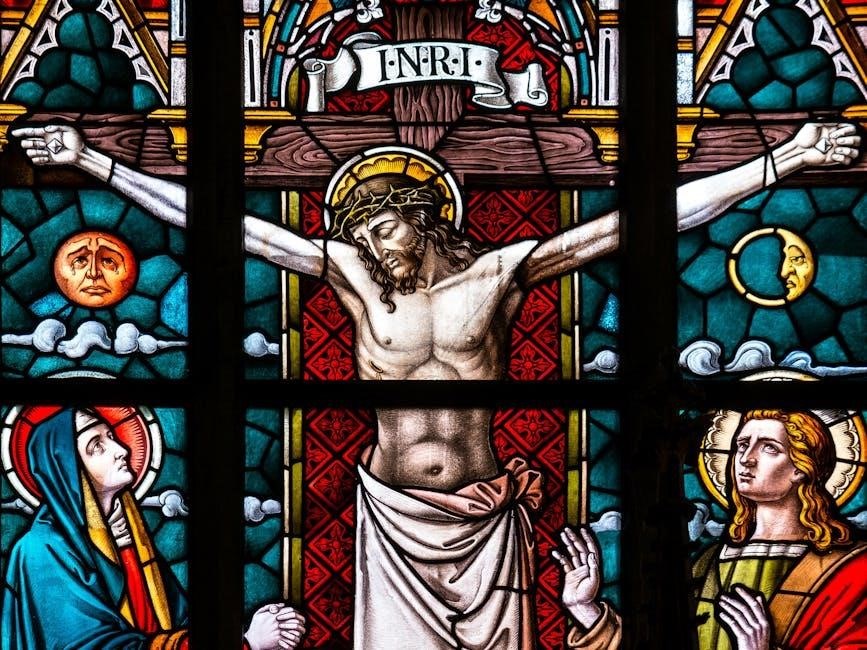John Calvin’s Institutes of the Christian Religion is a foundational theological work published in 1536, providing a systematic exploration of Christian doctrine․
It explores themes such as the knowledge of God, salvation, and the role of the Church, remaining a pivotal text in Reformed theology․
1․1 Historical Context and Purpose
The Institutes of the Christian Religion was first published in 1536 by John Calvin, a key figure in the Protestant Reformation․ Written in Latin, it aimed to systematize Christian doctrine and provide a clear, accessible guide for understanding Protestant beliefs․ Calvin intended the work to aid pastors and laypeople alike, offering a theological framework rooted in Scripture․ The Institutes were structured around the Apostle’s Creed, reflecting Calvin’s desire to present a comprehensive yet organized exploration of Christian faith․ Over time, the text underwent revisions, expanding in depth and influence, becoming a cornerstone of Reformed theology and shaping Protestant thought for centuries․ Its purpose remains to guide believers in their understanding of God and salvation․
1․2 Importance in Christian Theology
The Institutes of the Christian Religion holds a pivotal place in Christian theology as a foundational text of Reformed theology․ It systematically articulates Protestant doctrine, emphasizing God’s sovereignty, humanity’s sinfulness, and salvation through grace alone․ Calvin’s work bridges biblical exegesis, theological reflection, and practical application, making it a cornerstone for understanding Christian faith․ Its influence extends beyond academia, shaping church practices, devotional life, and theological education for centuries․ As a comprehensive guide, it remains indispensable for scholars and believers seeking to grasp the essence of Christian doctrine and its relevance in everyday life, ensuring its enduring legacy in the history of theology․
Structure and Organization of the Institutes
The Institutes is divided into four books, structured around the Apostles’ Creed, systematically exploring the knowledge of God, humanity, salvation, and the Church’s role in Christian life․
2․1 The Four Books of the Institutes
The Institutes is organized into four books, each addressing distinct theological themes․ The first book explores the knowledge of God the Creator, discussing humanity’s natural revelation and the divine attributes․ The second book examines the knowledge of God the Redeemer, focusing on the person and work of Christ․ The third book delves into the way of salvation through Christ, including faith, justification, and sanctification․ The fourth book discusses the external means of grace, such as the Church, sacraments, and civil government․ This structure provides a comprehensive framework for understanding Reformed theology, guiding believers in their spiritual journey and doctrinal understanding․
2․2 The Apostles’ Creed as a Framework
John Calvin structured the Institutes around the Apostles’ Creed, using it as a theological framework to organize Christian doctrine systematically․ The Creed’s articles—belief in God the Father, Jesus Christ, and the Holy Spirit—serve as the foundation for the work․ Calvin divides the Institutes into four books, aligning with the Creed’s themes: the knowledge of God the Creator, the knowledge of God the Redeemer, the way of salvation through Christ, and the external means of grace․ This framework allows Calvin to present complex theological concepts in a logical and accessible manner, guiding readers from the basics of faith to a deeper understanding of Christian living and the role of the Church․

Key Theological Themes
The Institutes explores the knowledge of God as Creator and Redeemer, the way of salvation through Christ, and the external means of grace, shaping Reformed theology profoundly․
3․1 The Knowledge of God the Creator
In the Institutes, Calvin emphasizes that true wisdom begins with the knowledge of God and humanity․ He argues that God reveals Himself through both natural revelation (creation) and supernatural revelation (Scripture)․
Calvin stresses the doctrine of the image of God in humanity, affirming human dignity but also highlighting the distortions caused by sin․
He maintains that while reason can discern God’s existence, only Scripture provides a clear understanding of God’s nature and will․
This knowledge fosters reverence, worship, and aright relationship with the Creator, shaping Calvin’s theological framework․
3․2 The Knowledge of God the Redeemer
Calvin underscores the knowledge of God as Redeemer, focusing on humanity’s redemption through Jesus Christ․ He emphasizes the Fall and humanity’s enslavement to sin, necessitating divine redemption․
Christ, as the mediator, fulfills the law and atones for sin, restoring humanity’s relationship with God․
Calvin highlights the role of faith in receiving salvation, stressing that redemption is entirely God’s work, achieved through grace alone․
This doctrine is central to Calvin’s theology, illustrating God’s mercy and justice while affirming the Trinitarian nature of redemption, where the Father plans, the Son executes, and the Spirit applies salvation to believers․
3․3 The Way of Salvation Through Christ
In the Institutes, Calvin explains that salvation is entirely God’s work, achieved through Jesus Christ, emphasizing faith as the means to receive this grace․
He highlights the union with Christ, where believers are justified and sanctified through His righteousness and sacrificial death․
Calvin stresses that salvation is a Trinitarian act: the Father plans, the Son executes, and the Holy Spirit applies it to believers․
This doctrine underscores humanity’s total dependence on God’s mercy, rejecting any role for human merit in salvation․
3․4 The External Means of Grace
Calvin emphasizes the external means of grace, such as Scripture, preaching, and the sacraments, as vital for nurturing faith and spiritual growth․
He views these means as instruments through which God conveys His grace, enabling believers to grow in knowledge and communion with Him․
The sacraments, particularly baptism and the Lord’s Supper, are seen as visible signs of God’s promises, reinforcing faith and unity among believers․
These external means are not merely symbolic but are effectual in strengthening the spiritual life of the Church, as they are administered by Christ through the Spirit․

The Doctrine of Predestination
Calvin’s doctrine of predestination reflects God’s sovereignty, emphasizing His eternal purpose in salvation, a central theme in the Institutes․
4․1 Definition and Biblical Basis
Predestination, as outlined in Calvin’s Institutes, refers to God’s eternal decree regarding the salvation of certain individuals․ Calvin grounded this doctrine in Scripture, particularly Romans 8:28-30 and Ephesians 1:11, which emphasize God’s sovereignty and grace․ He argued that salvation is entirely God’s work, with election based on divine pleasure rather than human merit․ This teaching underscores the Reformed emphasis on God’s unmerited favor and the assurance of salvation for the elect․ Calvin’s view of predestination is central to his theology, shaping his understanding of God’s providence and humanity’s total dependence on divine grace․
4․2 Controversies and Misunderstandings
Calvin’s doctrine of predestination has sparked significant debate, with critics arguing it renders God unjust or humanity devoid of free will․ Misunderstandings often arise from its perceived harshness, particularly the concept of double predestination․ Some interpret it as God actively condemning certain individuals to damnation, rather than merely passing over them; This has led to accusations of fatalism and theological cruelty․ However, Calvinists emphasize that predestination underscores God’s sovereignty and grace, not human merit․ Despite criticisms, the doctrine remains a cornerstone of Reformed theology, with supporters arguing it aligns with biblical teachings and glorifies God’s redemptive plan․

The Sacraments in Calvin’s Theology
Calvin viewed sacraments as vital for worship and spiritual growth, emphasizing baptism as a symbol of regeneration and the Lord’s Supper as communion with Christ, reflecting his eucharistic theology․
5․1 Baptism and the Lord’s Supper
In the Institutes, Calvin emphasizes baptism as a sacrament symbolizing regeneration and union with Christ, while the Lord’s Supper represents spiritual communion with Him․ He viewed baptism as a one-time initiation into the Church, signifying forgiveness and new life․ The Lord’s Supper, according to Calvin, involves the believer’s spiritual participation in Christ’s body and blood, rejecting transubstantiation but affirming a real, though spiritual, presence․ Both sacraments serve to deepen faith and foster unity with Christ and His Church, reflecting Calvin’s eucharistic theology․ These teachings are accessible in PDF formats of the Institutes, preserving their theological depth for modern readers․
5․2 The Eucharistic Theology of John Calvin
John Calvin’s eucharistic theology, detailed in the Institutes, emphasizes the spiritual presence of Christ in the Lord’s Supper․ He rejected the Catholic doctrine of transubstantiation, arguing that the bread and wine remain unchanged․ Instead, Calvin taught that believers spiritually partake of Christ’s body and blood through faith, nourishing their souls․ This view, often called “spiritual presence,” distinguishes Calvin’s theology from both Catholic and Lutheran perspectives․ The Lord’s Supper, for Calvin, is a means of grace that strengthens believers’ union with Christ and fosters communal worship․ His teachings on the Eucharist remain central to Reformed theology and are accessible in PDF editions of the Institutes․
The Role of the Church
The church, as per Calvin, is a structured community governed by disciplined practices, fostering spiritual growth through sacraments and collective worship․ The Institutes in PDF formats ensure Calvin’s theological insights remain accessible, guiding modern believers in understanding the church’s role in Christian living․
6․1 Ecclesiastical Government
Calvin’s Institutes emphasize a structured ecclesiastical government, advocating for a presbyterian system with four offices: pastors, teachers, elders, and deacons․ This framework ensures orderly worship, discipline, and community care․ The Institutes, available in PDF, highlight Calvin’s vision for a church governed by scriptural principles, balancing authority and accountability․ His reforms influenced Reformed traditions, stressing the importance of collective leadership and the role of the church in guiding believers toward godly living․ This governance model remains central to Calvinist ecclesiology, providing a blueprint for church organization and function․ The PDF editions of the Institutes offer insights into Calvin’s enduring legacy in church governance․
John Calvin viewed church discipline as essential for maintaining purity and order within the congregation․ In his Institutes, accessible in PDF, he argues that discipline ensures adherence to biblical standards, promoting holiness and unity; He advocates for a system where elders and church leaders enforce moral accountability through teaching, correction, and, when necessary, excommunication․ This approach fosters a community committed to spiritual growth and accountability․ The PDF versions of the Institutes detail Calvin’s emphasis on discipline as a means to uphold the integrity of the Church, reflecting his broader vision for a disciplined and devout Christian society․ This principle remains influential in Reformed traditions today․ John Calvin, born on July 10, 1509, and died in 1564, was a prominent theologian and Reformation leader․ His Institutes of the Christian Religion, first published in 1536, profoundly shaped Protestant theology and practices, leaving a lasting legacy in Christian thought and Reformed traditions․ John Calvin was born on July 10, 1509, in Noyon, France, to a family of modest means․ His father, a notary, encouraged his early education in Paris, where Calvin studied theology and law․ John Calvin’s Institutes of the Christian Religion became a cornerstone of Reformed theology, profoundly shaping the Protestant Reformation․ His systematic presentation of Christian doctrine provided clarity and depth, influencing countless theologians and reformers․ Calvin’s emphasis on the sovereignty of God, predestination, and the authority of Scripture reshaped theological discourse․ His leadership in Geneva established a model for Reformed church governance, while his writings on sacraments and church discipline further solidified his legacy․ The Institutes remains a foundational text, guiding theological thought and practice for centuries, ensuring Calvin’s enduring impact on Christian theology and the Reformation movement․ The Institutes of the Christian Religion are available as free PDFs on platforms like CCEL, Litres, and Google Books, ensuring easy access for readers․ The Institutes of the Christian Religion are widely available in PDF format, accessible through platforms like CCEL, Litres, and Google Books․ The Institutes of the Christian Religion is available in multiple translations, with Henry Beveridge’s English version being particularly renowned for its fidelity to Calvin’s Latin original․ Calvin’s Institutes remain influential in contemporary theology, offering insights into Christian living and doctrine, making it a vital resource for modern spiritual and academic exploration․ John Calvin’s Institutes of the Christian Religion continues to shape theological discourse, particularly within Reformed traditions․ The Institutes of the Christian Religion offers practical guidance for Christian living by emphasizing the pursuit of godliness and the transformative power of faith․ The Institutes faced criticism for its strict view of predestination and Calvin’s interpretation of divine sovereignty, sparking debates about free will and human responsibility in salvation․ Calvinism, rooted in the Institutes, has faced criticism for its doctrine of predestination, which some argue makes God’s sovereignty seem harsh and humanity’s role in salvation passive․ Supporters of Calvinism argue that its emphasis on God’s sovereignty and grace provides a profound understanding of divine love and human dependence on God․6․2 The Importance of Church Discipline
The Life and Influence of John Calvin
7․1 Early Life and Conversion
By 1533, Calvin underwent a profound spiritual conversion, shifting his focus from law to theology․ This transformation led him to embrace the principles of the Protestant Reformation, shaping his future as a theologian and reformer․7․2 Calvin’s Impact on the Reformation

The Institutes in PDF Format
8․1 Availability and Accessibility
These digital versions, often free to download, ensure global reach and ease of access for scholars and general readers alike․8․2 Popular Translations and Editions
Modern editions, such as those published by Westminster John Knox Press, offer updated language while preserving the theological depth․
Additionally, electronic versions in formats like EPUB and MOBI cater to contemporary readers, ensuring the text remains accessible and relevant in the digital age․Modern Relevance and Application
9․1 Continuing Influence in Theology
Its systematic approach to Christian doctrine has influenced countless scholars and remains a cornerstone in theological education․
The work’s emphasis on the sovereignty of God and the authority of Scripture resonates deeply in modern theological debates․
Furthermore, its exploration of themes like predestination and the sacraments provides a framework for understanding complex doctrinal issues․
Even in the digital age, the availability of the Institutes in PDF formats ensures its teachings remain accessible and relevant to a new generation of theologians and lay readers alike․
This enduring influence underscores the timeless value of Calvin’s magnum opus in shaping Christian thought․9․2 Practical Applications in Christian Living
Calvin’s teachings on prayer, the sacraments, and the importance of community worship provide a framework for daily spiritual practice․
The Institutes also stress the necessity of living a life of gratitude and obedience to God, reflecting His sovereignty and grace․
Moreover, its focus on the means of grace, such as Scripture and the Eucharist, equips believers to deepen their relationship with Christ․
These principles, accessible in PDF formats, continue to inspire believers to live a life of purpose and devotion, grounded in biblical truth and Reformed theology․
Criticisms and Controversies
10․1 Critique of Calvinism
Detractors claim it undermines human free will and moral responsibility, fostering fatalism rather than genuine spiritual engagement․
Additionally, critics challenge Calvin’s strict interpretation of Scripture, particularly regarding the sacraments and church governance, arguing it limits the grace of God and neglects the mystical dimensions of faith․
These critiques have led to ongoing theological debates about the balance between divine sovereignty and human agency․10․2 Responses to Criticisms
They counter critiques of predestination by highlighting its biblical roots and the comfort it brings in knowing God’s eternal plan․
Calvinists also refute the charge of undermining free will, asserting that human decisions, though influenced by grace, remain genuine․
They emphasize the Institutes’ balanced theology, which integrates God’s initiative with human responsibility, fostering humility and trust in divine provision․
Many defenders argue that Calvinism has been misrepresented and that its teachings offer a rich, cohesive framework for Christian living and worship․
